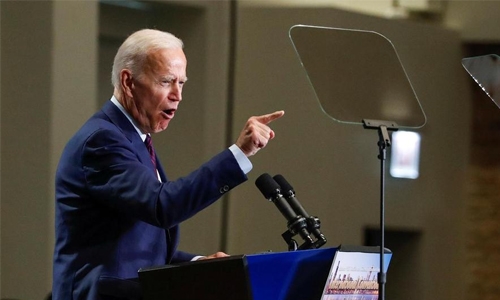Why can’t there be better manners in politics?
Is it possible to disagree with someone, even to the point of considering some of their ideas profoundly wrong, or as having wicked consequences, and yet still be able to work with them to achieve a goal you have in common – and perhaps even become friends? That is the question former vice president Joe Biden tried to raise recently, drawing on his early days as a young senator, when a far greater spirit of bipartisanship flourished in the US Congress.
Alas, the famously gaffe-prone Mr Biden chose to illustrate his point in the worst possible way, mentioning two senators notorious for having opposed desegregation, James Eastland and Herman Talmadge. Although Mr Biden emphasised how little he had in common with the two Dixiecrats, his recollection that “at least there was some civility” because conservatives were the opposition, not the enemy, got completely lost. The example was simply too inflammatory. That was a pity, because one quality urgently lacking in politics today, not just in the US but in the UK and many other countries, is that sense of civility and bipartisanship – of reaching across the aisle and of recognising that different, honest and earnest views and principles can be held, even if one believes the other is misguided.
This was far more common until only very recently. Mr Biden would have been on surer footing, for instance, if he had mentioned the role he’d played in working with the Republican leader of the senate, Robert Dole, in the 1980s, to ensure that special provisions in civil rights legislation were extended. In fact, Mr Biden was close to several ideological opponents, such as the late senator John McCain, at whose funeral he delivered one of the eulogies. There are many other examples. The Republican president Ronald Reagan had a genuine friendship with the Democratic speaker of the House, Tip O’Neill. “While neither man embraced the other’s world view, each respected the other’s right to hold it.
Each respected the other as a man,” recalled the speaker’s son, Thomas O’Neill. Former president Barack Obama, a Democrat, formed an unlikely bond with John Boehner, the Republican speaker who did much to frustrate him while commanding a majority in the House of Representatives. In the UK, it might surprise some to know that the godfather to the son of Diane Abbott, the Labour shadow home secretary, is the former Conservative cabinet minister Jonathan Aitken. Two of the towering intellects of late 20th century British politics, Michael Foot and Enoch Powell, could not have been more different.
Foot was arguably the most left-wing leader the Labour Party has ever had, while Powell was a Thatcherite before Margaret Thatcher and, in the eyes of most people, an unrepentant racist. But the two came together to oppose constitutional reforms proposed by the Wilson government in the 1960s and both campaigned against Britain’s membership of the European Economic Community (later the European Union) in the 1970s.
The two shared a mutual high regard, too, with Foot praising Powell as an “outstanding personality” who had been misunderstood. Such cross-party camaraderie is increasingly rare today while the raised drawbridges of party and principle make any kind of connection and understanding all the harder. The right – most certainly US President Donald Trump and his Republican allies – declares war on the left, deliberately misinterpreting the words and positions of their opponents, while hardline Brexiteers in the UK frequently accuse those who disagree with them of being “traitors”.
Much of the left, on the other hand, is in thrall to a furious judgmentalism that casts into the wilderness anyone not fully signed up to the latest iteration of “woke” politics. Former radicals who have not changed their views then find themselves denounced as reactionaries while universities are pressured into shielding students from the views of scholars whom one might have supposed ought to be on their reading lists. Such polarisation is dangerous for a number of reasons, not least of which is the old saying that you cannot fully justify your own views without truly understanding those of your opponents.
But real damage can also be done by refusing to be open to the ideas of others. A few years ago, then prime minister of Malaysia, Najib Razak, came up with a policy called 1Malaysia, which was an attempt to overcome the divides of race and religion that still bedevil the country. As I discovered talking to members of what was then the opposition, some of them thought that it was a good, genuine idea. But in public they panned it as a publicity stunt, because they could not bear to support an initiative of the government of the day.
In that case, party trumped all; and thus died the greatest effort to create a truly Malaysian identity for decades. Of course, this does not mean that acts or policies that truly are despicable should not be called out as such. The Trump administration’s policy of separating migrant children from their families strikes me as one such. Mr Biden’s across-the-aisle act went too far in the instance of his warm relationship with Strom Thurmond, who once ran for president on a nakedly segregationist platform. But equally the former vice president was putting his finger on something important, however imperfectly he framed it.
Anger and partisanship do need to be dialled down. Even admitting that your opponents are honourable and principled seems too much to ask for in the current climate. That is not the way to bring together increasingly bitterly divided societies. So give Uncle Joe credit where it’s due. The more civilised era he harks back to is surely preferable to the raging times we find ourselves in today.
Related Posts

